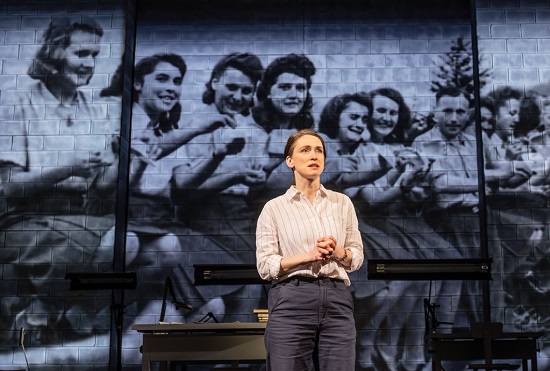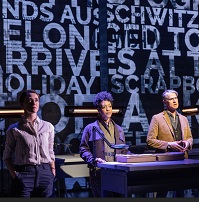Here There Are Blueberries

Tickets from $85 Buy Tickets

Cititour.com Review
In theater, as in life, timing is often everything. Take the arrival of the Tectonic Project’s “Here There Are Blueberries,” now at New York Theatre Workshop. It’s a potent warning about how the Holocaust may have happened – and could happen again – a thought on the minds of so many people in this era of antisemitism and anti-Israel protests.
Unsurprisingly in our current “political” climate (and possibly any climate), the show is undeniably powerful, as it constantly reminds us about “the banality of evil” in which seemingly ordinary people allowed themselves – or even volunteered themselves – to be complicit in one of the world’s greatest atrocities.
That said, expectations can be as dangerous in life as in theater, and the play – which is based on events from 2006 and has been in development for decades – was just announced earlier this month to be a finalist for The Pulitzer Prize for Drama, giving it an even greater impratur. Still, it’s possibly advantageous if one approaches the work, which was conceived, directed and co-written by the great Moises Kauffman (along with script writer Amanda Gronich), without concentrating on all its hype.
Told in a documentary-style, multi-media presentation, the show focuses on a photo album that suddenly was delivered to the United States Holocaust Memorial Museum which depicted the everyday life of the powers that be who ruled Auschwitz in the final year of World War II. (The actual photos, which can be chilling, are displayed on the back wall of Derek McLane’s clever yet functional set.) No inmates are ever shown, but one never forgets they are somewhat outside the frames.
As the museum’s researchers, headed by the practical Judy Cohen (an always compelling Kathleen Chalfant) and the somewhat more emotionally invested Rebecca Erbelding (a very impressive Elizabeth Stahlmann), soon learn, the album belonged to – and was shot by -- a one-time bank teller, Karl Hocker (Scott Barrow, one of eight cast members ably playing multiple roles), who became an important player in the SS.
Hocker not only became the main assistant to the camp’s cruel commandant, but often spent his days sunning himself at a local retreat, picking blueberries, or even just touring gas chambers and crematoria! Worse yet, how can he later claim in court that he knew nothing about what happened outside his office? At least, some of his contemporaries had the decency to kill themselves, or took the cowardly route and escaped to South America.
The piece’s strength lies in the fact that it doesn’t focus entirely on Hocker or other Nazis. For her part, Rebecca is literally haunted by the fact that had she lived in the 1930s or 1940s, she might have become a member of the Helferennin – the young women who worked in the communications offices at Auschwitz – and one identifies with her dilemma.
We also see the psychological effects on the descendants of some of the perpetrators – who seemingly knew little about what their ancestors did – including Tilman Tauba (a fine Jonathan Raviv), the grandson of one of the camp’s doctors, and Rainer Hoss (an impassioned Charlie Thurston), whose grandfather was the actual creator of Auschwitz.
But, at times, one feels the show’s 90 minutes could have been more efficiently spent. An opening sequence about the popularity of the Leica camera in Germany seems a tad superfluous; not enough time is really devoted to the debate within the museum whether to display the photos to the public; and some of the minor characters could have been eliminated entirely.
Still, as we all try to “never forget,” this play forces us to remember what seemed unthinkable, but no longer is.
By Brian Scott Lipton
Visit the Site
https://www.nytw.org/
Open/Close Dates
Opening 5/13/2024
Closing 6/30/2024
Theatre Info
New York Theatre Workshop
79 East 4th Street
New York, NY 10003
Map
Comments


 Sign up for our newsletter !
Sign up for our newsletter !